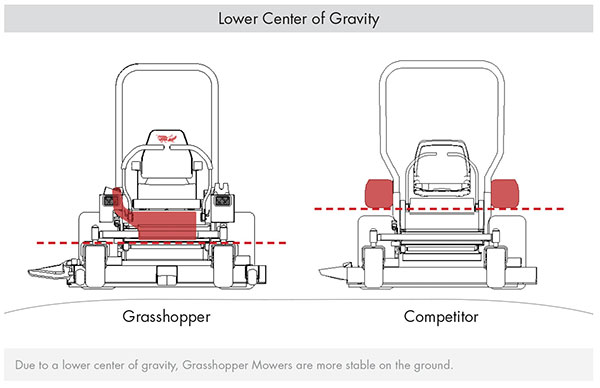Diesel vs. LPG/CNG
Propane is a byproduct of crude oil and natural gas refining. As a byproduct, propane is not an alternative to fossil fuel consumption and does nothing to reduce dependence on volatile fuel producing nations. There are also storage and technical concerns posed by LP and CNG fuel designs on commercial mowers:
A hallmark of the Grasshopper design, low center of gravity (LCG) provides stability that significantly improves handling characteristics, especially on undulating turf surfaces. The position of the fuel tank is important to LCG. Placing weight above the fenders of the unit and beside the operator, such as with most LP/CNG tank designs, has adverse effects on LCG:

Cold Starting
Equipment must start up easily each day. Glow plug technology allows MaxTorque™ diesel engines to preheat the combustion chamber prior to starting. LP fuel, on the other hand, can be difficult to cold start. Typical single-fuel LP or CNG models don't have systems in place to aid with cold starting. Gasoline as a backup and as a cold-starting fuel is highly recommended if LP or CNG is the primary fuel.
Engine Conversions and Warranties
Before any decision is made to convert a gas engine to propane, it's imperative that the engine manufacturer certify the engine for warranty. Propane fuel is notoriously hard on engines that were designed for gasoline, and the loss risk is great if warranty coverage is denied. Never depend on a verbal commitment – always get warranty statements in writing.
Engine Lubrication and Component Life
Diesel is a somewhat lubricating fuel (as is gasoline). Properties of the fuel are essential for lubricating engine cylinder heads, valves, valve seats and guides. LP and CNG, on the other hand, are dry fuels that may shorten engine component life. Current estimates for normal engine life using LP fuel are under 1,000 hours, especially for those engines that were designed for gasoline but converted to LP.

